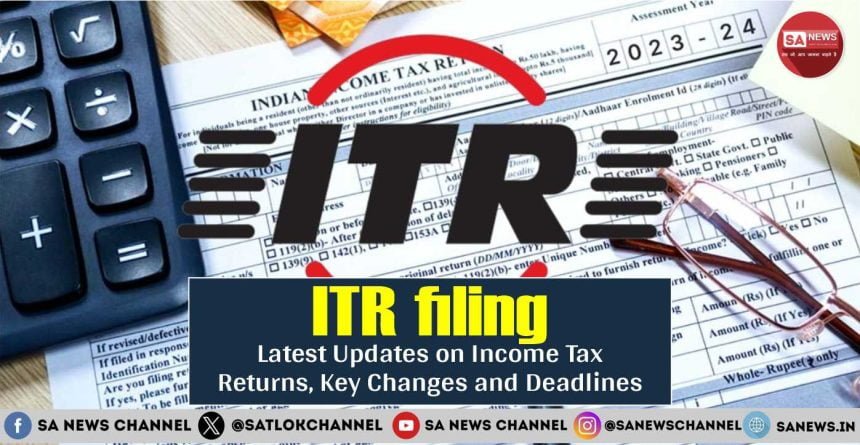ITR filing Last Date 2024: ITR verification is a very important step in ensuring the authenticity and validity of tax returns, enabling the Income Tax Department to process returns efficiently, prevent fraud, and maintain an accurate and secure tax system.
- Key Highlights on ITR filing Last Date 2024
- Be Alert and Aware of Last Date to File ITR
- ITR filing Last Date 2024: Check Every Detail Closely
- Which Documents are Required?
- Work Will Not be Done Without Form 16/16A
- Return will Come Only After Verification
- ITR filing Last Date 2024: How to Get Return?
- FAQs: ITR filing Last Date 2024
- Que 1. What is an Income Tax Return (ITR)?
- Que 2. Who is required to file an ITR?
- Que 3. What are the different types of ITR forms?
- Que 4. What is the deadline for filing ITR?
- Que 5. What documents are required to file an ITR?
- Que 6. What are the penalties for late filing of ITR?
- Connect With Us on the Following Social Media Platforms
Key Highlights on ITR filing Last Date 2024
1. Last date to file ITR is 31st July
2. Check every detail closely
3. Ensure all required documents
4. Work will not be done without Form 16/16A
5. Return will come only after verification
6. ITR gives information about tax deduction and payments for the whole year.
Be Alert and Aware of Last Date to File ITR
ITR filing Last Date 2024: The last date for filing an Income Tax Return (ITR) is 31st July and is very near. If you do not file ITR by the deadline, you may face trouble and may also have to pay a fine. In such a situation, ITR should be filed as soon as possible.
If you are filing your ITR yourself for the first time, then you need to pay special attention to some things. Otherwise, you may also get a notice from the Income Tax Department.
ITR filing Last Date 2024: Check Every Detail Closely
ITR filing Last Date 2024: While filling ITR, it is important to pay attention to small details. All your personal information should be correct such as PAN, Aadhaar, and bank account details. If there is a mistake in this, then your ITR may be rejected or there may be a delay in getting the refund. You may even get a notice from the Income Tax Department.
Which Documents are Required?
ITR filing Last Date 2024: Form 26AS and Annual Information Statement are required to file income tax returns. Form 26AS contains all the information related to TCS (Tax Collected at Source) along with TDS (Tax Deducted at Source) deduction on interest, salary, and dividend.
■ Also Read: Breaking Down Budget 2024: Major Highlights on Income Tax, Infrastructure, Railways, EVs, and Beyond
At the same time, the Annual Information Statement (AIS) contains all the details required under the Income Tax Act 1961. It contains information about taxpayers in two parts. The first contains the personal details of the taxpayer, such as Aadhaar, PAN card, and mobile number. At the same time, the second contains technical information related to tax.
Work Will Not be Done Without Form 16/16A
ITR filing Last Date 2024: Form 16 is for those people whose source of income is only salary. At the same time, Form 16A says that TDS was deducted from other income sources apart from salary. Such as income earned in the form of interest on fixed deposits, insurance commissions, rent receipts, securities, etc.
ITR filing Last Date 2024: When you get this form, immediately match all the information so that there is no problem. If there is any mistake in Form 16/16A, then immediately inform the concerned employee about it. If you are in the old tax regime, then make sure that the LTA, HRA, and other exemptions are mentioned correctly.
Return will Come Only After Verification
Filing income tax return can get you a refund, for this you will have to verify the ITR. Income tax department processes the ITR only after verifying it. Taxpayers can also verify ITR offline. This is called e-verification.
■ Also Read: Zee Media Shares Surge 8% on Approval for Rs 200 Crore Fundraising
After verification of the taxpayer’s return, it usually takes 15 to 45 days to process it. If verification is done online, then it may take more time to process.
ITR filing Last Date 2024: How to Get Return?
ITR filing Last Date 2024: ITR gives information about tax deduction and payment made by the taxpayer during the whole year. If you have deposited more tax than your liability, then you can claim the return and get back the excess amount. Returns are verified by the Income Tax Department. If the claim information is recorded in Form-16, then it does not take much time to process. If the information in Form-16 is not updated, then processing may be delayed.
FAQs: ITR filing Last Date 2024
Que 1. What is an Income Tax Return (ITR)?
Ans. An Income Tax Return (ITR) is a form that individuals, businesses, and other entities use to report their income, expenses, and other relevant financial information to the tax authorities. Filing ITR is mandatory for those who earn income above a certain threshold.
Que 2. Who is required to file an ITR?
Ans. Anyone whose income exceeds the basic exemption limit specified by the tax authorities must file an ITR. This includes salaried employees, self-employed individuals, businesses, and entities like trusts and partnerships.
Que 3. What are the different types of ITR forms?
Ans. There are several types of ITR forms, such as ITR-1, ITR-2, ITR-3, ITR-4, and so on, each catering to different categories of taxpayers based on their income source and amount. For instance:
ITR-1: For individuals with income from salary, one house property, and other sources (excluding lottery and racehorses).
ITR-2: For individuals and HUFs not having income from business or profession.
ITR-3: For individuals and HUFs having income from a proprietary business or profession.
ITR-4: For individuals, HUFs, and firms (other than LLP) having income from a presumptive business.
Que 4. What is the deadline for filing ITR?
Ans. The deadline for filing ITR typically falls on July 31st for individuals and November 30th for businesses and companies, though these dates can be extended by the government.
Que 5. What documents are required to file an ITR?
Ans. Key documents required for ITR filing are:
Form 16/16A (TDS Certificate)
Form 26AS (Tax Credit Statement)
Salary slips
Bank statements
Investment proofs (for deductions)
Home loan statements
PAN card
Aadhaar card
Que 6. What are the penalties for late filing of ITR?
Ans. Late filing of ITR can attract penalties ranging from INR 1,000 to INR 10,000 depending on the delay period. Interest on the outstanding tax amount may also be applicable.









